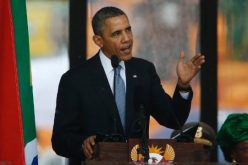
Wearing his Boston Marathon runner’s jacket, David Delmar, a member of Trinity Episcopal Church in Boston, attends a service at Temple Israel, which allowed the Trinity congregation to hold their service, Sunday in Boston. Trinity is within the blocked-off area near the finish line of the Boston Marathon, where earlier in the week two bombs exploded.
Julio Cortez/AP
Just days after the Boston Marathon bombing, the political maneuvering and blaming have begun. Some lawmakers fault the FBI for not following up on intelligence about one of the alleged bombers. Others want to prosecute the surviving suspect as an enemy combatant.
It may be plainly obvious who was responsible for the horrific Boston Marathon bombing on Patriots’ Day: ethnically Chechen brothers Tamerlan and Dzhokhar Tsarnaev, one dead in a shoot-out with police, the other seriously wounded and sedated in a Boston hospital where investigators are eager to interrogate him.
Unexploded bombs were found in their apartment, surveillance videos show them carrying heavy backpacks in the vicinity of and just before the explosions that killed three people and injured more than 180, and they are said to have acknowledged their responsibility to the driver of a car they hijacked.
But less than a week after a train of events that kept Boston-area towns on lock-down for days, the political maneuvering and blaming have already begun.Russian officials warned the US about the older Tsarnaev brother – Tamerlan – in 2011. When Tamerlan returned from a six-month stay in Russia the next year, US officials questioned him and his family about any ties with radical Islam but determined that he was not a threat.
“The ball was dropped in one of two ways,” US Sen. Lindsey Graham (R) of South Carolina said on CNN’s “State of the Union” Sunday. “The FBI missed a lot of things, is one potential answer, or our laws do not allow the FBI to follow up in a sound solid way.”
“It’s people like this that you don’t want to let out of your sight, and this was a mistake,” Sen. Graham said. “Either our laws are insufficient or the FBI failed, but we’re at war with radical Islamists and we need to up our game.”
“This is at least the fifth case I’m aware of where the FBI has failed to stop someone,” Rep. King said on “Fox News Sunday,” citing the examples of Anwar al-Awlaki, Nidal Malik Hasan, Carlos Bledsoe, and David Coleman Headley.
“This is the latest in a series of cases like this … where the FBI is given information about someone being a potential terrorist,” he said. “They look at them, and then they don’t take action, and then [those individuals] go out and commit murders.”
Speaking on NBC’s “Meet the Press,” US Rep. Mike Rogers (R) of Michigan says the fault in this case rests with Russian intelligence services who failed to fully cooperate with the FBI.
Christian Science Monitor










